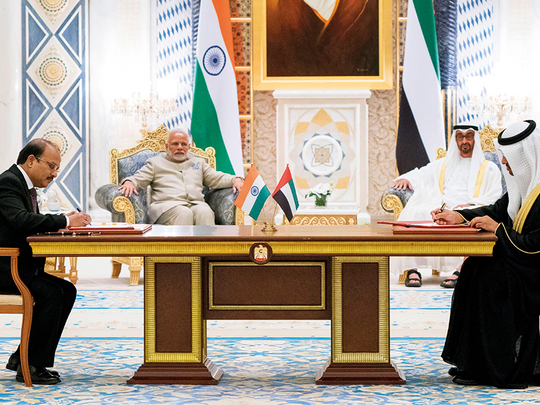
Abu Dhabi: The new energy agreement between the UAE and India is expected to be positive for both countries, with India getting added energy supply security and the UAE, a long-term market for its crude.
Abu Dhabi and India’s Oil and Natural Gas Corporation (ONGC)-led consortium signed a 10 per cent offshore concession agreement late on Saturday evening, giving Indian companies an opportunity to develop Abu Dhabi’s lucrative offshore oilfields which produce about 1.4 million barrels of oil per day.
The consortium, led by India’s ONGC Videsh, contributed a participation fee of Dh2.2 billion ($600 million) to enter the Lower Zakum concession, which will be operated by the Adnoc Offshore, a subsidiary of the Abu Dhabi National Oil Company (Adnoc), on behalf of all concession partners.
This is the first time that an Indian company will be involved in the development of oilfields in Abu Dhabi.
“The deal is positive for both countries. For India, it helps for long-term supply going to the country, and for the UAE, a long-term market for its crude as well,” Edward Bell, a commodity analyst from Emirates NBD, told Gulf News over the phone. “It makes a lot of economic and commodity sense to have this relationship between the two countries.”
Indian energy consumption is expected to more than double by 2040, accounting for 25 per cent of the rise in global energy in the same period, as well as the largest absolute growth in oil consumption.
India is 79 per cent dependent on imports to meet its crude oil needs, 8 per cent of which are supplied by the UAE.
Speaking further on the agreement, Bell added that it reflects a trend seen on the part of Adnoc to get its main customers involved in the actual upstream side of the oil and gas industry to cement its relationship.
In the last onshore concession, Adnoc awarded long-term contracts to Japanese, Chinese, and South Korean companies, among others.
Echoing similar views, Jaafar Al Taie, managing director of Manaar Energy, said the deal will boost economic ties between the two countries and will give India secure energy supplies.
“The most immediate benefit for India is access to an oil and gas investment opportunity, which has a history of yielding between 15-20 per cent rate of return year-on-year, with a potential for improvement depending on how the new consortium will function together in streamlining costs and sustaining operational efficiencies,” he said.
He also added that Indian energy firms now have a stronger foothold to expand throughout the region.
“The deal indicates a sustained global interest in the UAE energy sector that is undeterred by lower oil prices and maturing oil & gas assets. There is a strong momentum and a set price tag for other global investors to enter the competition in terms of renewal of the Adma [Abu Dhabi Marine Operating Company] offshore concessions.”
Challenges
He, however indicated that lower oil prices and the technical know-how when it comes to operating in mature oilfields will pose major challenges for Indian companies.
“ONGC and the Indian hydrocarbon sector is a virtual newcomer to oil and gas operations in the Middle East and [have] a small track record of successful production operations in the region.”
Alongside the concession award, Adnoc and the Indian Strategic Petroleum Reserves Ltd (ISPRL) also exchanged agreements to implement a strategic crude oil storage facility in the southern Indian city of Mangalore.
The partnership with ISPRL, an Indian government-owned company mandated to store crude oil for strategic needs, covers the storage of 5.86 million barrels of Adnoc crude oil in underground facilities at the Karnataka facility.












